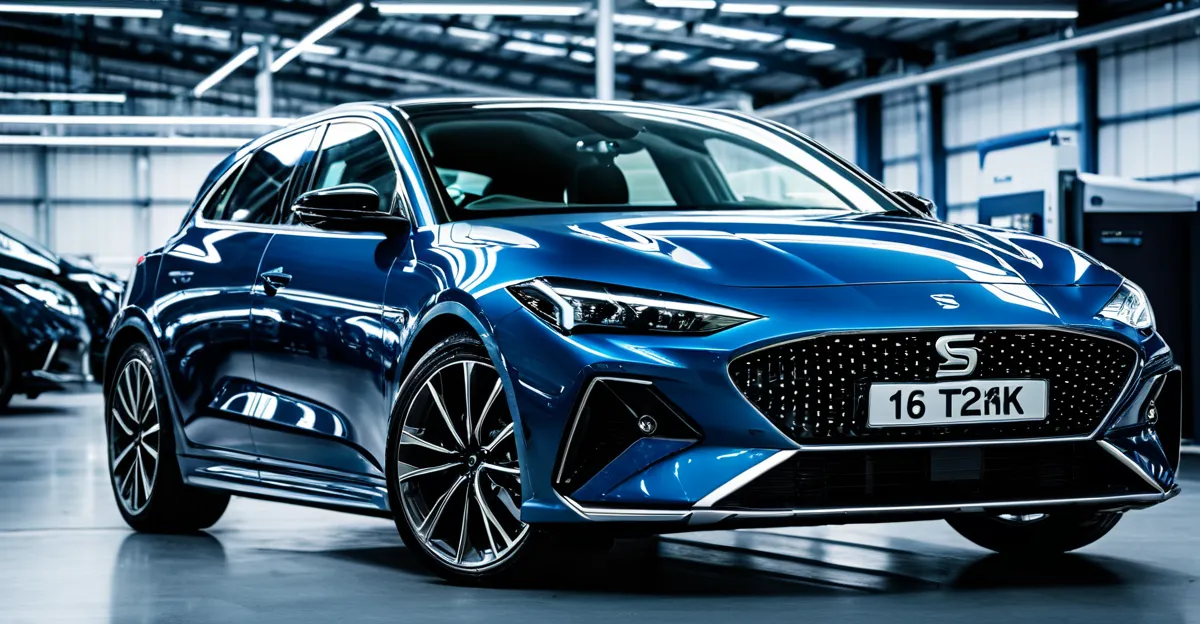Overview of Digital Transformation in the UK Automotive Industry
The digital transformation within the UK automotive industry is accelerating rapidly, reshaping how manufacturers, suppliers, and consumers operate. This wave of digitalization trends reflects a shift towards more connected, efficient, and consumer-focused practices that are redefining the sector’s landscape.
Consumer expectations have evolved significantly as digital technologies become integral to car design, purchasing, and ownership. Buyers now demand seamless, tech-enabled experiences, prompting UK automotive companies to respond with innovations such as digital showrooms, enhanced online services, and interactive vehicle features. This demand creates a continuous push for transformation that aligns with digital consumer habits.
Also read : How Will Future Trends Shape the UK Automotive Industry?
Recent data highlights this pace: investment in digital technologies within UK automotive firms has surged, reflecting an awareness that staying competitive requires embracing digital solutions. Experts note that these transformations are no longer optional but essential for survival, influencing everything from production methods to customer engagement. The UK automotive industry exemplifies how digitalization is not limited to incremental improvements but involves thorough reinvention of processes to maximize flexibility, insight, and value.
Rise of Online Vehicle Sales and Digital Retail
The online vehicle sales sector within the UK automotive industry is undergoing a significant transformation driven by digital automotive retail innovations. Consumers increasingly prefer end-to-end online car buying processes, which allow them to research, select, finance, and even finalize vehicle purchases without visiting a physical dealership. This shift reflects broader digitalization trends where convenience and transparency are paramount.
Additional reading : How Will Autonomous Vehicles Impact Car Ownership in the UK?
Notably, several UK brands are pioneering these e-commerce platforms, integrating user-friendly web interfaces and virtual showrooms that simulate traditional dealership experiences. These platforms often include features such as live chat with sales advisors, augmented reality vehicle previews, and tailored finance options, responding to consumer expectations for seamless digital interactions.
The impact of digital automotive retail reflects strongly in the market: recent consumer adoption statistics indicate a steady rise in online vehicle purchases year-on-year. This change not only drives sales growth but also compels traditional dealerships to adapt by incorporating hybrid digital and physical sales models. The continued evolution of online vehicle sales is instrumental in shaping the future UK automotive landscape, delivering both efficiency for sellers and improved buyer satisfaction.
Expansion of Connected and Smart Vehicle Technologies
The UK automotive industry is witnessing a notable surge in the integration of connected vehicles and smart cars, driven by advancements in telematics technology and digital connectivity. Connected vehicles use Internet of Things (IoT) frameworks to facilitate real-time data exchange between cars, infrastructure, and cloud services, enhancing safety, convenience, and responsiveness.
Telematics technology plays a pivotal role in this transformation by continuously monitoring vehicle performance, driver behavior, and environmental conditions. This data is harnessed to optimize safety features such as automatic emergency braking or adaptive cruise control, while also providing maintenance alerts that prevent breakdowns, thereby improving overall vehicle reliability and user experience.
The upcoming widespread adoption of 5G networks significantly supports these capabilities, enabling faster data transmission and lower latency. This facilitates complex vehicle-to-everything (V2X) communication, where smart cars interact seamlessly with other vehicles, traffic signals, and road sensors. Such connectivity helps manage traffic flow, reduce accidents, and boost fuel efficiency.
UK manufacturers are increasingly embedding these digitalization trends into their products, responding to consumer demand for more intelligent, interactive vehicle features. As a result, connected vehicles and smart cars form a cornerstone of the industry’s ongoing digital transformation, signalling a shift towards more autonomous, data-driven automotive solutions.
Digitalization in Supply Chains and Manufacturing
The UK automotive industry is embracing digital transformation by integrating advanced technologies into supply chains and manufacturing processes. This shift is a fundamental part of the broader digitalization trends reshaping production and logistics for automotive firms nationwide.
One core innovation is the use of digital twins—virtual replicas of manufacturing environments that enable real-time monitoring and predictive adjustments. These digital models allow manufacturers to simulate and optimize assembly lines, reducing downtime and enhancing product quality. Real-time analytics feed continuous data into these systems to quickly identify inefficiencies and bottlenecks.
Additionally, artificial intelligence (AI) and machine learning play key roles in managing the automotive digital supply chain, helping predict disruptions and dynamically reallocating resources to maintain smooth operations. By gaining enhanced supply chain visibility, companies can respond proactively to risks such as material shortages or logistical delays, an advantage crucial in today’s complex global markets.
UK manufacturers are also spearheading smart manufacturing approaches that blend automation with connected devices to increase flexibility and speed. Examples include robotic assembly systems powered by AI and sensors that monitor equipment health to schedule just-in-time maintenance, minimizing unexpected breakdowns.
Together, these digital solutions represent an Industry 4.0 evolution that boosts efficiency, reduces costs, and ensures resilience across the UK automotive supply chain. Their growing adoption signals a transformative step towards fully integrated, intelligent production ecosystems.
AI and Automation Shaping Operations and Services
The integration of automotive AI and automation is profoundly reshaping operations and services within the UK automotive industry. By harnessing machine learning applications, manufacturers enhance predictive maintenance capabilities, enabling early detection of vehicle issues before failure occurs. This proactive approach reduces downtime and operational costs while improving vehicle reliability and customer satisfaction.
AI-powered automation extends beyond maintenance. It streamlines production lines by optimizing workflows and enabling real-time decision-making. Machine learning algorithms analyze vast datasets from sensors and manufacturing systems to identify inefficiencies and automatically adjust processes. This leads to increased precision and faster cycle times, contributing directly to higher productivity in smart factories.
The impact of these technologies on the workforce is significant yet nuanced. While some manual tasks are automated, new roles focusing on AI system oversight, data analysis, and digital skillsets are emerging, requiring upskilling and training initiatives. Case studies from UK automotive firms illustrate successful AI deployments that balance efficiency gains with workforce adaptation strategies.
Overall, automotive AI and automation form crucial pillars of UK manufacturers’ digital transformation strategies, delivering operational excellence and future-proofing the industry.
Electric Vehicle (EV) Technologies and Infrastructure
The UK automotive industry is experiencing a marked acceleration in electric vehicles (EV) adoption, driven by advances in both manufacturing capabilities and supportive infrastructure. The growing market share of EVs reflects a broader commitment across the sector to sustainability and carbon reduction targets, aligning tightly with national policy ambitions.
Key to this transformation is the development of EV battery technology, where innovations in energy density, charging speed, and lifecycle durability enhance vehicle performance and user convenience. UK manufacturers are investing heavily in next-generation batteries to boost range and reliability, which directly addresses common consumer concerns about electric car usability.
Simultaneously, the expansion of charging networks across the UK plays a crucial role in fostering EV adoption. Increasingly widespread fast-charging hubs reduce range anxiety by offering convenient and rapid charging options in urban and rural areas alike. This infrastructure growth, coupled with integrated payment systems and location apps, makes owning and operating EVs more accessible.
UK government policies are significantly accelerating EV uptake. Incentives like purchase grants, tax relief, and planning regulations encourage both consumers and manufacturers to prioritize electric vehicles. Strategic investments supporting charging infrastructure and research into battery recycling highlight a comprehensive approach designed to sustain this momentum.
Together, these developments constitute a transformative period for the UK automotive industry, positioning electric vehicles at the heart of its digital transformation and future competitiveness. Continued progress in EV adoption UK will depend on the seamless integration of technology, infrastructure, and policy support to meet evolving consumer and environmental demands.
Enhancing Customer Experience with Digital Tools
The UK automotive industry is increasingly focusing on improving customer experience by integrating advanced automotive digital services that cater to modern expectations. This digital transformation enables manufacturers to offer personalisation at an unprecedented level, reshaping how drivers interact with their vehicles and service providers.
One key development is the proliferation of in-car digital ecosystems and smart infotainment features. These integrated systems provide seamless connectivity between smartphones, navigation, entertainment, and vehicle functions, enhancing convenience and enjoyment during travel. Consumers benefit from voice-activated controls, personalized content streaming, and real-time traffic updates, all tailored to individual preferences.
Personalised customer interfaces extend beyond the vehicle itself. Mobile apps and digital platforms allow users to manage maintenance schedules, remotely control vehicle settings, and access tailored offers from dealerships. The use of data analytics to understand user behavior supports customization, creating experiences that align closely with individual needs and lifestyle choices.
This digitalization trend significantly influences customer loyalty and satisfaction. By providing intuitive, accessible, and responsive digital tools, UK automotive companies build stronger relationships with buyers, encouraging repeat business and fostering brand affinity. The emphasis on enhancing customer experience through digital services is thus a central pillar of the broader digital transformation within the industry.
Data-driven Business Models and Services
The UK automotive industry is increasingly adopting data-driven business models powered by advanced automotive data analytics. Manufacturers and service providers leverage vast amounts of vehicle and user data to develop innovative mobility services that transcend traditional car ownership. This digital transformation enables the creation of flexible, customer-centric offerings such as subscription services and mobility-as-a-service (MaaS) platforms, which cater to evolving consumer preferences for access over possession.
How do automotive companies utilize vehicle and user data effectively? They analyze real-time telematics, driving patterns, and maintenance needs to tailor services like predictive maintenance, personalized insurance plans, and usage-based billing. For example, mobility services harness this data to optimize fleet management and improve customer convenience by suggesting the most efficient travel options or adjusting vehicle availability dynamically.
This expansion of data monetisation models opens new revenue streams while enhancing user experience through more responsive and adaptive service designs. However, strong emphasis on data privacy and protection under UK regulations is critical. Companies implement robust compliance frameworks to ensure transparent data handling and safeguard consumer information, addressing growing stakeholder concerns.
The rise of automotive data analytics not only drives innovation but also fosters collaboration across industry sectors, integrating transport, technology, and urban planning to create smarter mobility ecosystems. As the UK automotive industry continues to embrace data-driven services, it positions itself at the forefront of the digitalization trends shaping the future of mobility.


